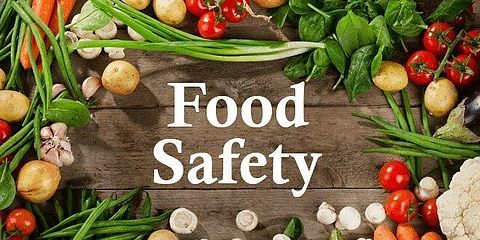
- Home
- Live Blog
- Breaking News
- Top Headlines
- Cities
- NE News
- Sentinel Media
- Sports
- Education
- Jobs

The monitoring of food safety standards among licensed food business operators is receiving a technological boost in India, reflecting sustained efforts to mainstream consumers’ participation in enforcement. The Food Safety and Standards Authority of India (FSSAI) recently asked all Food Business Operators (FBOs), including restaurants, dhabas, cafes, and eateries, to display their FSSAI Licence/Registration certificate with the QR code of the Food Safety Connect App in customer-visible areas, such as entrances, billing counters, or seating areas. The FSSAI says that the ‘Food Safety Connect’ app, a user-friendly platform developed by it, allows consumers to lodge complaints regarding food safety and hygiene issues, report misleading claims on food products, access basic information about licensed and registered FBOs and stay informed about FSSAI’s latest food safety initiatives and alerts. The effectiveness of such digital platforms is anchored on how consumers perceive food safety, hygiene and safe handling. Persistent unhygienic food preparation and unsafe food handling practices among some street food vendors at prominent places across Guwahati city mirror the systemic gaps in consumer awareness despite the tightening of food safety norms and strengthening of regulatory measures. Such a gap underscores the importance of upscaling consumer awareness simultaneously with formalisation of the informal food sectors – particularly street food vendors and small-scale FBOs – through special drives of registration and licensing. Ironically, consumers regularly eating at these informal unhygienic eateries, even in prime locations of the city, include a significant number of educated people, which reveals a deeper disconnect between FSSAI initiatives to build food safety awareness and the lived realities of choice and preference of food among a section of citizens. Incidences of food-borne disease cannot be checked without proactively engaging those consumers and food vendors and small-scale operators in targeted awareness campaigns on food safety standards. The complaints lodged through the FSSAI app are automatically routed to the concerned jurisdictional authority, which ensures prompt action and minimises delays in addressing consumer grievances, states the food safety regulator. This digital empowerment will reach out to those sections of consumers who visit licensed FBOs but will leave out a large section of consumers in urban and peri-urban areas who primarily depend on unlicensed and unregistered food vendors on the streets for quick meals during busy workdays. Seizure of adulterated food – such as fake paneers – in different parts of the country highlights that the health risk posed to consumers regularly eating out at unregistered street food vendors is not limited to unhygienic preparation or unsafe food handling but also includes serving adulterated and hazardous food. The Clean Street Food initiative of FSSAI is a pragmatic strategy to address the problem, as it involves training and capacity building of the street food vendors for registration. The desired outcomes of this initiative can be realised only through an inclusive approach of reaching out to all such vendors instead of setting targets for popular food streets in a city and targeting a fixed number of vendors. Building awareness among consumers – particularly among urban poor and lower middle-class consumers who depend on street food vendors – parallel to this initiative is crucial to increase demand for hygienic and safe food. When consumer awareness of food-borne diseases gradually increases, the unregistered street vendors will realise that adoption of safe and hygienic practices in food preparation and serving will be essential for the sustainability of their food business, and they will voluntarily seek to register. A crucial benefit of focusing on consumer awareness of food safety is reducing the burden of foodborne disease on the public healthcare delivery system and freeing hospital beds, doctors, and nurses engaged in treating such patients to enable them to devote more time to treating patients suffering from more serious ailments. Lessons must be learnt from gaps in various awareness campaign drives so that correct strategies are adopted to strengthen the awareness of food safety standards. The official campaigns for consumer awareness help reach out to the targeted audience but are not enough to sustain the efforts. Proactive public engagement and people’s initiatives are needed to turn the campaigns into a powerful social movement for lasting change. Involving more and more civil society organisations and encouraging free-wheeling discussions among the people, more particularly at the food hubs, can be far more effective than target-driven official campaigns. Directing the awareness efforts to engage the unregistered food vendors and consumers in frequent discussion about procurement of food ingredients, storage, cooking medium, cleaning of utensils, serving plates or dishes, etc., is essential to bring about a transformative change. The real challenge for FSSAI and the Food Safety Departments of the States lies in extending the awareness drive beyond the informed audience. Innovative use of social media channels can bridge the gap left by routine campaign drives conducted through conventional traditional channels of communication, which often lack the required space and flexibility to explain nuances of food safety standards.